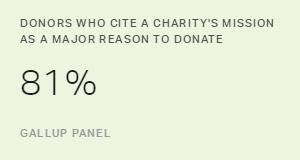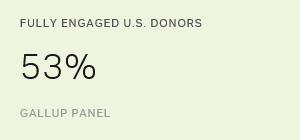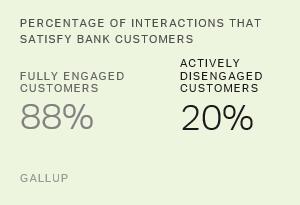Story Highlights
- Mission matters most in donation decisions
- Donors want to know exactly where their money goes
- Donors do substantial research on charities
This article is the second in a three-part series on charitable donations.
A charitable organization's purpose is more than words in a brochure. It is the most influential factor in motivating donors to give.
Gallup has found that 81% of donors -- U.S. adults who have donated to a charitable organization in the past 12 months -- say their belief in an organization's mission is a major reason why they donate to a charity. These individuals are also highly more likely to be fully engaged with an organization and are twice as likely to donate more to it in the next 12 months compared with those who say the mission is a minor reason or not a reason to donate.
The problem is that many charities aren't inspiring their donors to give. Gallup has found that 5% of American donors plan to decrease their giving in the next year. This finding suggests that billions of lost dollars in donations are at stake.
Though a compelling statement of purpose is important for motivating donations, knowing what an organization does and why is only one part of the donor equation. Donors must also believe a charity acts on its purpose. When potential or current donors see a disconnect between what an organization says it does and what it actually does, they are less likely to give to that organization.
More than half of donors (57%) also say that wanting to make a difference is a major reason they choose to give money to charity. Donors want to know who or what their donation benefits and how their contribution positively affects someone's life or the world.
A Strong Organizational Identity Attracts Donations
Gallup's analysis also shows that 54% of donors are highly motivated to give when they believe it is the right thing to do. Here, an organization's brand or service promise comes into sharp focus. When a charity has a stable and believable reputation, it becomes easier for donors to put their trust in it.
| Major reason | |||||||||||||||||||||||||||||||||||||||||||||||||||||||||||||||||||||||||||||||||||||||||||||||||||
|---|---|---|---|---|---|---|---|---|---|---|---|---|---|---|---|---|---|---|---|---|---|---|---|---|---|---|---|---|---|---|---|---|---|---|---|---|---|---|---|---|---|---|---|---|---|---|---|---|---|---|---|---|---|---|---|---|---|---|---|---|---|---|---|---|---|---|---|---|---|---|---|---|---|---|---|---|---|---|---|---|---|---|---|---|---|---|---|---|---|---|---|---|---|---|---|---|---|---|---|
| % | |||||||||||||||||||||||||||||||||||||||||||||||||||||||||||||||||||||||||||||||||||||||||||||||||||
| I believe in the mission of the organization. | 81 | ||||||||||||||||||||||||||||||||||||||||||||||||||||||||||||||||||||||||||||||||||||||||||||||||||
| I want to make a difference. | 57 | ||||||||||||||||||||||||||||||||||||||||||||||||||||||||||||||||||||||||||||||||||||||||||||||||||
| It is the right thing to do. | 54 | ||||||||||||||||||||||||||||||||||||||||||||||||||||||||||||||||||||||||||||||||||||||||||||||||||
| The charitable organization supports someone in my life. | 48 | ||||||||||||||||||||||||||||||||||||||||||||||||||||||||||||||||||||||||||||||||||||||||||||||||||
| Someone in my personal life asks me to donate. | 43 | ||||||||||||||||||||||||||||||||||||||||||||||||||||||||||||||||||||||||||||||||||||||||||||||||||
| I see a personal story of someone that the organization is helping and I want to help too. | 20 | ||||||||||||||||||||||||||||||||||||||||||||||||||||||||||||||||||||||||||||||||||||||||||||||||||
| I feel obligated to give. | 13 | ||||||||||||||||||||||||||||||||||||||||||||||||||||||||||||||||||||||||||||||||||||||||||||||||||
| Someone in my professional life asks me to donate. | 10 | ||||||||||||||||||||||||||||||||||||||||||||||||||||||||||||||||||||||||||||||||||||||||||||||||||
| Charitable donations are tax-deductible. | 8 | ||||||||||||||||||||||||||||||||||||||||||||||||||||||||||||||||||||||||||||||||||||||||||||||||||
| My employer supports the organization. | 4 | ||||||||||||||||||||||||||||||||||||||||||||||||||||||||||||||||||||||||||||||||||||||||||||||||||
| Gallup Panel, Dec 2-16, 2015 | |||||||||||||||||||||||||||||||||||||||||||||||||||||||||||||||||||||||||||||||||||||||||||||||||||
Among the reasons that lead people to give to charity, a clear purpose and trustworthy brand or service statement generate the most goodwill. When donors feel they understand how an organization is spending their money, they are more likely to give to it. Just over six in 10 people (61%) say they are very likely to donate to a charity if they know what exactly their money is being used for. Similarly, 45% of people who believe an organization has a good reputation say they are very likely to donate.
| Very likely | |||||||||||||||||||||||||||||||||||||||||||||||||||||||||||||||||||||||||||||||||||||||||||||||||||
|---|---|---|---|---|---|---|---|---|---|---|---|---|---|---|---|---|---|---|---|---|---|---|---|---|---|---|---|---|---|---|---|---|---|---|---|---|---|---|---|---|---|---|---|---|---|---|---|---|---|---|---|---|---|---|---|---|---|---|---|---|---|---|---|---|---|---|---|---|---|---|---|---|---|---|---|---|---|---|---|---|---|---|---|---|---|---|---|---|---|---|---|---|---|---|---|---|---|---|---|
| % | |||||||||||||||||||||||||||||||||||||||||||||||||||||||||||||||||||||||||||||||||||||||||||||||||||
| If you know EXACTLY what your money is being used for | 61 | ||||||||||||||||||||||||||||||||||||||||||||||||||||||||||||||||||||||||||||||||||||||||||||||||||
| If you know the charitable organization has a good reputation | 45 | ||||||||||||||||||||||||||||||||||||||||||||||||||||||||||||||||||||||||||||||||||||||||||||||||||
| If you know someone who is personally affected by the work of the charitable organization | 45 | ||||||||||||||||||||||||||||||||||||||||||||||||||||||||||||||||||||||||||||||||||||||||||||||||||
| In response to a fundraiser that someone close to you is participating in | 36 | ||||||||||||||||||||||||||||||||||||||||||||||||||||||||||||||||||||||||||||||||||||||||||||||||||
| In response to a fundraiser at your workplace (if applicable) | 31 | ||||||||||||||||||||||||||||||||||||||||||||||||||||||||||||||||||||||||||||||||||||||||||||||||||
| If your workplace offers easy ways to donate | 24 | ||||||||||||||||||||||||||||||||||||||||||||||||||||||||||||||||||||||||||||||||||||||||||||||||||
| In response to a large-scale natural disaster, such as a hurricane, tornado or tsunami | 19 | ||||||||||||||||||||||||||||||||||||||||||||||||||||||||||||||||||||||||||||||||||||||||||||||||||
| In response to a large-scale humanitarian crisis, such as famine or a refugee crisis | 15 | ||||||||||||||||||||||||||||||||||||||||||||||||||||||||||||||||||||||||||||||||||||||||||||||||||
| In response to specific data or statistics that demonstrate the need | 7 | ||||||||||||||||||||||||||||||||||||||||||||||||||||||||||||||||||||||||||||||||||||||||||||||||||
| In response to stories about or pictures of the people who are helped by the charitable organization | 5 | ||||||||||||||||||||||||||||||||||||||||||||||||||||||||||||||||||||||||||||||||||||||||||||||||||
| In response to a television commercial or online video that highlights a specific need | 2 | ||||||||||||||||||||||||||||||||||||||||||||||||||||||||||||||||||||||||||||||||||||||||||||||||||
| Gallup Panel, Dec 2-16, 2015 | |||||||||||||||||||||||||||||||||||||||||||||||||||||||||||||||||||||||||||||||||||||||||||||||||||
And donors certainly do their homework. Half of donors (50%) conduct some research on an organization before giving it any money, while just over three in 10 (31%) say they do a great deal of research. These findings further reinforce the importance of a strong purpose and brand in attracting donations.
Bringing Purpose, Brand and Culture Together
The best-run charities understand their purpose is a promise to the people who benefit from and donate to the organization. Charities build great reputations by delivering that promise to users and donors every single time. To maximize donations, charitable organizations must ensure they:
- present a clear and consistent purpose
- create and act on a compelling brand or service promise
- communicate consistently
But charitable organizations cannot overlook another vital piece of their organizational identity: the culture they create for their employees and volunteers. They must ensure their purpose, brand and culture align. Alignment has incredible power. It means everyone -- from leaders, employees and volunteers to donors and members of the media -- will think and talk about the organization in the same way.
Culture acts as an operating manual for an organization, helping people understand how its work gets done. Culture is instrumental in attracting employees and volunteers who are passionate about an organization's purpose and who are inspired to deliver on its brand or service promise. For nonprofits, whose financial resources are limited, culture is a vital tool in recruiting employees and volunteers.
Survey Methods
Results are based on a Gallup Panel web study of 17,174 U.S. adults who have donated to a charitable organization in the past 12 months, aged 18 and older, conducted Dec. 2-16, 2015. The Gallup Panel is not an opt-in panel, and panel members do not receive incentives for participating. For results based on this sample, one can say that the margin of sampling error is ±1 percentage point at the 95% confidence level. Margins of error are higher for subsamples. In addition to sampling error, question wording and practical difficulties in conducting surveys can introduce error or bias into the findings of public opinion polls.
Learn more about how the Gallup Panel works.


